Forecasts for artificial intelligence’s impact range from a better society to mass layoffs or worse. Here are 10 respected books to help grasp AI’s promise and pitfalls for business and beyond. Eight titles are new in 2024, while two are industry classics.
Books to Grasp AI
Brave New Words: How AI Will Revolutionize Education (and Why That’s a Good Thing) by Salman Khan
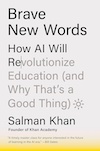
Brave New Words
Khan Academy’s founder argues that AI technologies can transform education by creating customizable learning tools. He explores its implications for teachers, parents, students, and society.
Co-Intelligence: Living and Working with AI by Ethan Mollick
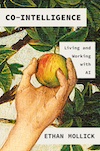
Co-Intelligence
One of Amazon’s top-rated AI books of 2024 and a bestseller since its publication in April, Wharton professor and AI expert Mollick analyzes the impact of AI in education and business through real-life examples and advocates learning to work with it effectively.
Welcome to AI: A Human Guide to Artificial Intelligence by David L. Shrier

Welcome to AI
Shrier, an authority on technology-driven innovation, discusses how accelerating advances in AI will affect how we learn, live, and work.
51 Essential AI Terms Explained for Leaders: A Non-Technical Guide by Marco Ryan
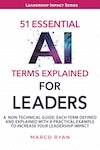
51 Essential AI Terms
This alphabetical guide, written by the former chief digital officer at British Petroleum, provides definitions, plain-language explanations, and real-life examples to help those without technical experience understand key AI terms related.
The Algorithm: How AI Decides Who Gets Hired, Monitored, Promoted, and Fired and Why We Need to Fight Back Now by Hilke Schellmann
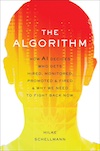
The Algorithm
Schellmann, a New York University professor and contributor to The Wall Street Journal, The Guardian, and National Public Radio, explores how AI tools are already used in human resource management and how faulty algorithms compound human biases. He advocates for more thoughtful practices in hiring, evaluating, and managing employees. The New York Times Book Review named it one of the five best books on AI, stating it “treats AI as a tool used by people, avoiding grand theories and wild speculations.”
The Coming Wave: Technology, Power, and the Twenty-first Century’s Greatest Dilemma by Mustafa Suleyman and Michael Bhaskar
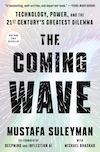
The Coming Wave
In this multi-award-winning book, Suleyman, who has led AI initiatives for Google and Microsoft, warns of the possible dangers of rapid technological advances such as quantum computing, synthetic biology, and AI while remaining optimistic about meeting these challenges.
Generative AI for Business Leaders: 2024 Edition by I. Almeida
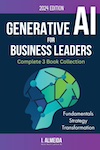
Generative AI for Leaders
This collection of three practical guides provides an overview of the potential risks and benefits as well as ways to reduce negative consequences and enhance business outcomes.
HBR’s 10 Must Reads on AI by Harvard Business Review and multiple authors
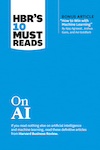
HBR’s 10 Most Reads on AI
This addition to Harvard Business Review’s “10 Must-Reads” series collects expert articles on using AI in business. It covers topics ranging from pricing algorithms to AI ethics.
The Business Case for AI: A Leader’s Guide to AI Strategies, Best Practices & Real-World Applications by Kavita Ganesan
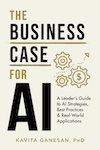
The Business Case for AI
Ganesan aims to demystify AI for business leaders looking to identify its opportunities. Though published in 2022, her book is still highly recommended by reviewers and experts for its real-world examples and jargon-free language.
The Alignment Problem: Machine Learning and Human Values by Brian Christian
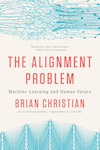
The Alignment Problem
Christian, an award-winning author and science journalist, examines how to align AI technology’s behavior with human values, which has become even more urgent with advances in AI technology in the four years since this book was published.






